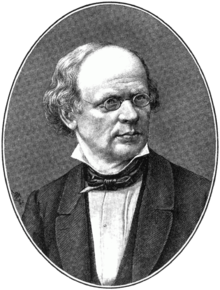Adolf Holtzmann
Adolf Holtzmann (2 May 1810, in Karlsruhe – 3 July 1870, in Heidelberg) was a German professor and philologist. His name is associated with a Proto-Germanic sound law known as Holtzmann's Law.
Adolf Holtzmann | |
|---|---|
 Adolf Holtzmann | |
| Born | May 2, 1810 |
| Died | July 3, 1870 (aged 60) |
| Nationality | German |
| Education | University of Halle |
| Alma mater | University of Berlin |
| Known for | Holtzmann's Law |
| Spouse(s) | Luise |
| Scientific career | |
| Fields | Philology |
| Institutions | University of Heidelberg |
| Academic advisors | Friedrich Schleiermacher |
He studied theology at the universities of Halle and Berlin, where he was a student of Friedrich Schleiermacher. He later studied philology at the University of Munich, where his influences included Johann Andreas Schmeller. Holtzmann also attended classes in Paris given by Eugène Burnouf, and beginning in 1837, spent a number of years working as a tutor to members of Baden royalty.[1] From 1852 he was a professor of German literature and Sanskrit at the University of Heidelberg, and a notable philologist of his day.[2]
Holtzmann was the father-in-law of Albrecht Kossel, German biochemist and 1910 Nobel laureate, by his marriage to Holtzmann's daughter, Luise, in 1886.[2]
Selected works
- Ueber den griechischen Ursprung des indischen Thierkreises, 1841 – On the Greek origin of the Indian zodiac.
- Über den Umlaut. Zwei Abhandlungen, 1843 – About the umlaut : two treatises.
- Über den Ablaut, 1844 – About the ablaut.
- Beiträge zur Erklärung der persischen Keilinschriften, 1845 – Contributions to explain Persian cuneiform inscriptions.
- Indische Sagen, 1st part 1845 and 3rd part 1847 (2nd ed. in two volumes 1854) – Indian legends.
- Untersuchungen über das Nibelungenlied, 1854 – Studies involving the "Nibelungenlied".
- Kelten und Germanen. Eine historische Untersuchung, 1855 – Celts and Germans, a historical study.
- Der große Wolfdieterich, 1865 – Wolfdietrich.
- Altdeutsche Grammatik, umfassend die gotische, altnordische, altsächsische Sprache, 1870-75 (with Alfred Holder) – Old German grammar; spanning Gothic, Old Norse and Old Saxon language.
- Germanische Alterthümer. Mit Text, Übersetzung und Erklärung von Tacitus Germania, 1873 – Germanic antiquities with text, translation and explanation of Tacitus' "Germania".
- Deutsche Mythologie, 1874 (edited by Alfred Holder) – German mythology.[3]
See also
- Holtzmann's Law
References
- ADB:Holtzmann, Adolf at Allgemeine Deutsche Biographie
- Jones, Mary Ellen (September 1953). "Albrecht Kossel, A Biographical Sketch". Yale Journal of Biology and Medicine. National Center for Biotechnology Information. 26 (1): 80–97. PMC 2599350. PMID 13103145.
- Most widely held works by Adolf Holtzmann WorldCat Identities
This article incorporates text from a publication now in the public domain: Wood, James, ed. (1907). "article name needed". The Nuttall Encyclopædia. London and New York: Frederick Warne.